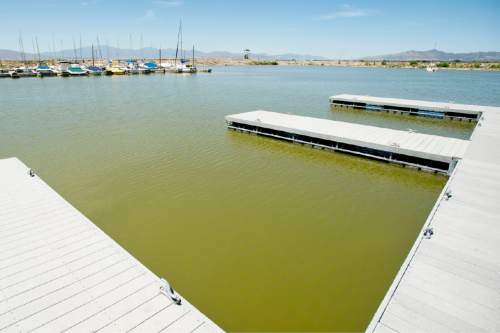This is an archived article that was published on sltrib.com in 2016, and information in the article may be outdated. It is provided only for personal research purposes and may not be reprinted.
Environmental Protection Agency officials earlier this month sent a letter to Utah's Division of Water Quality, noting that proposed legislation to make actions of the division subject to independent peer reviews do not comply with the Clean Water Act. Passing the bill without changes, the letter warned, could result in the federal government taking over water management for the state.
In the letter, dated Feb. 1, EPA regional water authorities raised concerns that SB110 does not meet the Clean Water Act's requirements for public participation, and that it could require the state to exempt certain permits from federally required technology-based waste limitations.
The EPA is, according to the letter, reluctant to involve itself in state legislative proceedings. However, the agency warned, if the bill passed and the EPA concluded the peer-review process did not meet the requirements of the Clean Water Act, the EPA could require the state to revisit the law.
When passing new water regulations or issuing water permits under the Clean Water Act, the Utah Division of Water Quality acts on authority granted by the EPA — which has been charged by Congress to enforce the Clean Water Act. Under extreme circumstances, if the EPA concluded the Division of Water Quality (DWQ) was no longer capable of upholding the Clean Water Act, it could revoke the DWQ's authority and assume management of the act in Utah.
A few environmental groups are already poised to petition the EPA to consider such action if SB110 moves forward unchanged, said Steve Erickson, a policy advocate for the Utah Audubon Council.
"The peer review process can't be the back door to trump the public process," he said. "It can't be used to trump permitting. ... Everyone wants good science to be used; that's not really the crux of the matter. It's how the process plays."
Walt Baker, the director of the Utah DWQ, said his division is working with the bill's authors — a coalition of water-treatment managers — to craft substitute language that would address the EPA's concerns.
That substitute hasn't been introduced yet; SB110 is waiting for a hearing on the Senate floor after gaining a favorable recommendation in committee earlier this month.
As written, SB110 would create a mechanism whereby a challenger could call for the assembly of an independent, three-person panel to review the validity of the science backing a DWQ decision.
To qualify to bring a challenge, a party would have to have a water quality permit, prove they would be affected by the decision in question and be willing to pay the costs associated with assembling the panel.
The panel could then take as much as a year to review the decision — be it a permit or a new water quality rule — and then issue an opinion. If the panel concluded the DWQ's decision was not scientifically defensible, the DWQ could not legally pursue that action.
According to the EPA, this could create situations where water policy could be proposed, evaluated and discarded, all without ever surfacing for public review.
The substitute bill does not address that concern, Baker said, but if it passes, the DWQ would likely institute a rule to require public hearings on final opinions issued by the peer review panel.
The second issue, Baker said, would be addressed by substitute language that would limit the SB110 peer review of technology-based limits to the scientific basis of those limits.
Technology-based standards are permit conditions based on the "reasonable" availability of technology, Baker said.
According to the EPA, these standards are intended to represent the minimum level of control to be applied in a permit.
Compliance with these standards, the letter warns, is mandatory.
Under SB110, if a peer review determines that a technology-based limit is not scientifically necessary, the challenger is automatically granted an exemption.
SB110 is novel legislation, Baker said — only two other states, Minnesota and California, have enacted peer-review statutes, and Utah's proposal "dwarfs" both states' provisions. If the Legislature adopts the bill, he said, Utahns will have to wait and see just how its actual implementation works.
"This is landmark," he said. "In my [31 years of] experience … this will be the most foundational change in the water quality program."
epenrod@sltrib.com Twitter: @EmaPen



